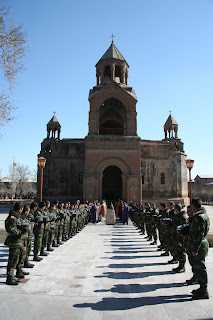The Turn Around – Lent Day 17
Lenten Recipe
Recipe 17: Asian Noodles with Edamame
Lenten Journey Day 17 – Turning Around
A wide variety of emotions and feelings accompany us on our Lenten Journey. Because we are each unique creations, we each approach our spirituality in different ways. Some may feel tranquility. Some may feel inner peace. Others may feel anxiety – fear of the unknown, of what may be ahead. And others yet, may not be able to process the physical changes that are taking place by virtue of the dietary restrictions. No matter where you may be in your spiritual quest, it is important to remember that we have taken this journey with purpose, with a goal in mind: to purify, to minimize, to find meaning and purpose not only for the duration of Lent but for our entire life. We must understand that these 40 days are training us for the other 325 days that are ahead of us.
I do not mean to confuse things, but think of experiences in your own life. When you have been confronted with a problem or difficulties, you may ponder and look for answers, when all along those answers exist within you. We have had those answers right from the beginning, much like the fabled Dorothy, who stands at the end of her journey in Oz, realizing that the answers were right at her feet all along. She receives the grand revelation that there is no place like home, not from outside herself, but by fact that she arrived at that revelation point. Sure enough, we found the same revelation this week in the parable of the Prodigal Son. The son returned home because that was where the answers were.
St. Nerses Shnorhali reminds us that the name of love is Jesus. We discovered it to be the “primer,” and we now understand Jesus’ words to mean that Love is the Way, the Truth and the Life. We have all known that all along. This is nothing new. It is just that we have alienated that section of our soul, mind and spirit from what is important and therefore forgotten that there is only one way and one truth. It happens to be Love. We have searched elsewhere, instead of looking within.
St. Nectarius reminds us, “Do not seek the kingdom outside of yourself, but the kingdom is within.” Jesus established his Church, his Kingdom here on earth, and that Church has its primary foundation in the human heart. That is where the owner’s manual belongs.
What we are beginning to see develop is the concept of repentance, that is, turning around, coming back: Point A to point A via point B. The most powerful tool a Christian has is repentance. When we realize we have made a mistake we have the ability to improve our self. We can turn back. That return to home worked for the Prodigal Son. There are different paths for each of our lives, but they all lead to the end of the Journey. For some, this journey will be from point A to B. For others it will be from point A to B and perhaps a C and D along the way until they get to E. And yet, for others still, it will be a full circle returning back home from and to point A. A loop or a little detour is nothing to be afraid of. Chock it up to the experience of life. In the mistakes and pains of life we learn. Fortunately, God has given plenty of room to make U-turns.
Let us pray the prayer of St. Nerses Shnorhali:
Fountain of immortality, let the tears of repentance flow from my heart like those of the adulteress that they may wash away the sins of my soul before I depart from this world. Have mercy upon all your creatures and upon me, a great sinner. (I Confess with Faith, 18/24)




